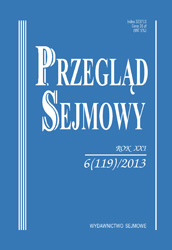Parlament we francuskiej tradycji ustrojowej
Parliament in the French Constitutional Tradition
Author(s): Jarosław SzymanekSubject(s): History of Law
Published by: Kancelaria Sejmu
Keywords: France; parliament; parliamentary system; Jacobin tradition; Bonaparte tradition; rationalization
Summary/Abstract: This article presents two different traditions of perception of parliament existing in the French doctrineof constitutional law. In the fi rst one — called the Jacobin tradition — parliament is treated quiteexceptionally, as an authority expressing national sovereignty and, therefore, unchallenged. That traditionhas found its fullest expression in the political system of the Third and Fourth Republic, and especially the Third Republic which developed an extremely strong position of parliament, calledthe monistic parliamentary system, one-sided, predominant pathological or extreme parliament. Fromthat time on in France a specific meaning ascribed to the phrase “parliamentarism” which has ceased to be only the system of government with specific relationships between the three elements of thesystem, i.e. the government — parliament — the head of state, and has become synonymous with exuberant, extremely strong position of parliament. This position was, inter alia, reflected in: the lack of formalized procedures for holding government to account, an exclusive character of acts of parliamentand their unrestricted scope, or election of the president of the Republic by parliament, whichled to the situation in which he became “a hostage of the parliamentary majority.”This position of parliament, so shaped or rather deformed, has driven the reform efforts, known as rationalization. All of them belong to the second section of French parliamentary tradition, associated with criticism and, consequently, the weakening of the position of parliament in the systemof government. This tradition, called the Bonaparte tradition, found its fullest expression in thepolitical system of the Fifth Republic. Therefore, Gaullism is sometimes called a contemporaryversion of Bonapartism. Their common denominator is the desire to restrict parliament in the name of balance of powers. They are reflected e.g. in the limitation of statutory matter, the introduction of constitutional judiciary or wider use of referendums and the establishment of universal and direct presidential elections. The latter two instruments especially have anti-parliamentary connotation, because they juxtapose parliament with two other institutions which also express national sovereignty
Journal: Przegląd Sejmowy
- Issue Year: 2013
- Issue No: 6
- Page Range: 93-115
- Page Count: 23
- Language: Polish

